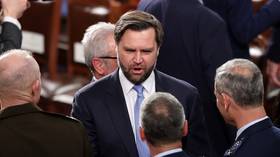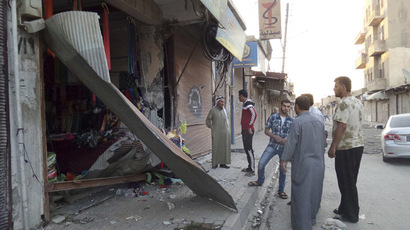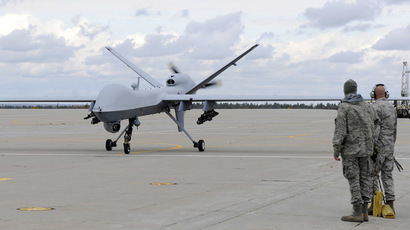Bombing ‘imminent threat’: US justifies strikes without ‘direct request’ from Syria
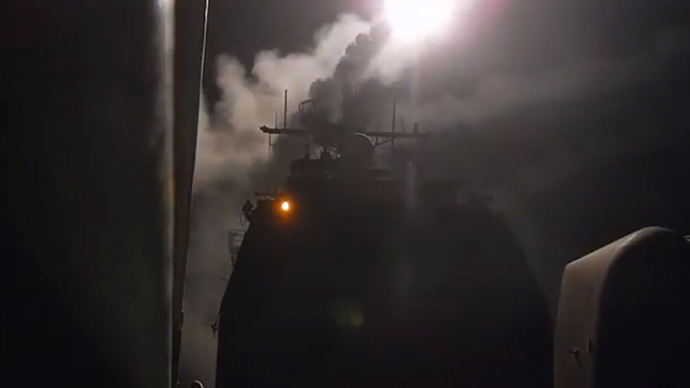
The UN chief is “aware” that the Syrian government did not directly “request” airstrikes on terrorist targets on their soil and urged all parties involved in the US-led anti-ISIS campaign to take all necessary precautions to minimize civilian casualties.
UN Secretary General Ban Ki-moon said he is “aware” that the US-led intrusion and airstrikes on Islamic State targets were not carried out “at the direct request of the Syrian Government,” in a statement delivered at a climate summit press conference.
However, he noted that Damascus “was informed beforehand” and that the strikes took place in “areas no longer under the effective control” of the government.
“I regret the loss of any civilian lives as a result of strikes against targets in Syria. The parties involved in this campaign must abide by international humanitarian law and take all necessary precautions to avoid and minimize civilian casualties,” the UN chief added.
READ MORE:8 civilians, incl. 3 kids, killed in US-led strikes on Syria
In a letter to the UN secretary general, US Ambassador Samantha Power used Article 51 of the UN charter to justify air strikes against ISIS targets in Syria, claiming that it was necessary to protect civilians and secure Iraq's borders.
The US explained that Iraq has “made it clear” that it faces a “serious” threat from the Islamic State militants coming from Syria, a country which Washington says offers “safe havens” for militants.
“These safe havens are used by ISIL (ISIS) for training, planning, financing, and carrying out attacks across Iraqi borders and against Iraq's people,” the letter reads.
It is because of this threat and at the request of the Iraqi government that the US decided to lead a coalition against Islamic State positions in Syria, “in order to end the continuing attacks on Iraq,” to protect civilians and help Baghdad secure state borders.
Letter from White House to UN justifying action against #ISIS in #Iraq and #Syria under Article 51: pic.twitter.com/BsQSMLi55y
— Joyce Karam (@Joyce_Karam) September 23, 2014
Stating that IS poses a dire threat both to the region as well as to the security of the United States, Powers writes that Article 51 of the UN charter provides countries the right to engage in self-defense, including collective self-defense, against an armed attack.
“As is the case here, the government of the State where the threat is located is unwilling or unable to prevent the use of its territory for such attacks,” the letter, dated September 23, reads.
It argues that strikes against ISIS in Syria are justified as the Syrian regime “cannot and will not confront these safe havens effectively itself.”
“Accordingly, the United States has initiated necessary and proportionate military actions in Syria in order to eliminate the ongoing ISIL threat to Iraq.”
In addition, Washington is also conducting military action against Al-Qaeda “elements in Syria known as the Khorasan Group,” which it believes could be responsible for plotting against America and its allies.
The air campaign against the Khorasan extremists was separate from the one targeting the Islamic State group, as the US believes they were close to carrying out “major attacks” against the West.
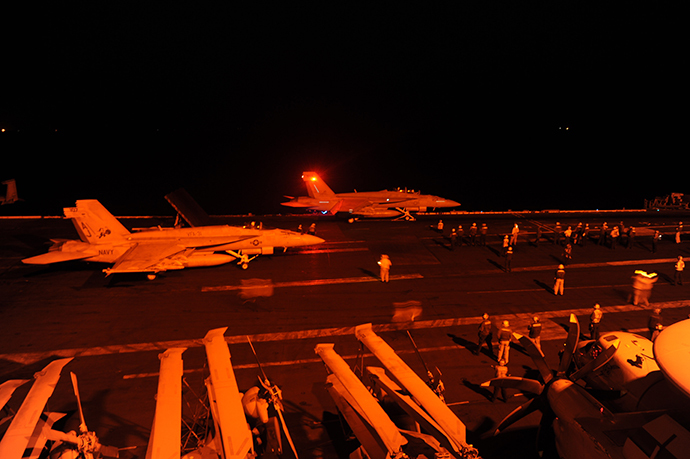
“Intelligence reports indicated that the group was in the final stages of plans to execute major attacks against Western targets and potentially the US homeland,” announced Lt. Gen. William Mayville, director of operations for the US Joint Chiefs of Staff.
He specified that the group is “establishing roots in Syria in order to advance attacks against the West and the homeland.”
Calling the strikes “successful,” Mayville also announced that more than 40 Tomahawk missiles were launched from the Gulf and the Red Sea, saying “the majority of the Tomahawk strikes were against Khorasan.”
Earlier in the day, US President Barack Obama said that he ordered the strikes in Syria to “disrupt plotting against the United States and our allies by seasoned al-Qaeda operatives in Syria, who are known as the Khorasan Group”.
“Once again, it must be clear to anyone who would plot against America and try to do Americans harm that we will not tolerate safe havens for terrorists who threaten our people,” he added.
LIVE UPDATES:Anti-ISIS coalition bombing terrorist positions in Syria
However, the US airstrikes will not be “effective, if there is no coordination of actions on the ground and if no ground military operations are carried out,” Syrian Foreign Minister Walid Moualem told RT Arabic.
“The US is mocking the whole world when they say that they are going to coordinate their actions not with the Syrian government, but with the moderate Syrian opposition. This is funny. What moderate opposition are you talking about?” Moualem told RT Arabic. “This moderate opposition is killing Syrians just like al-Nusra or ISIS.”
If the US “seriously wanted to fight the ISIS and other terrorist organizations,” there would be an international organization under the aegis of the UN, in which all countries would participate, Moualem said.


